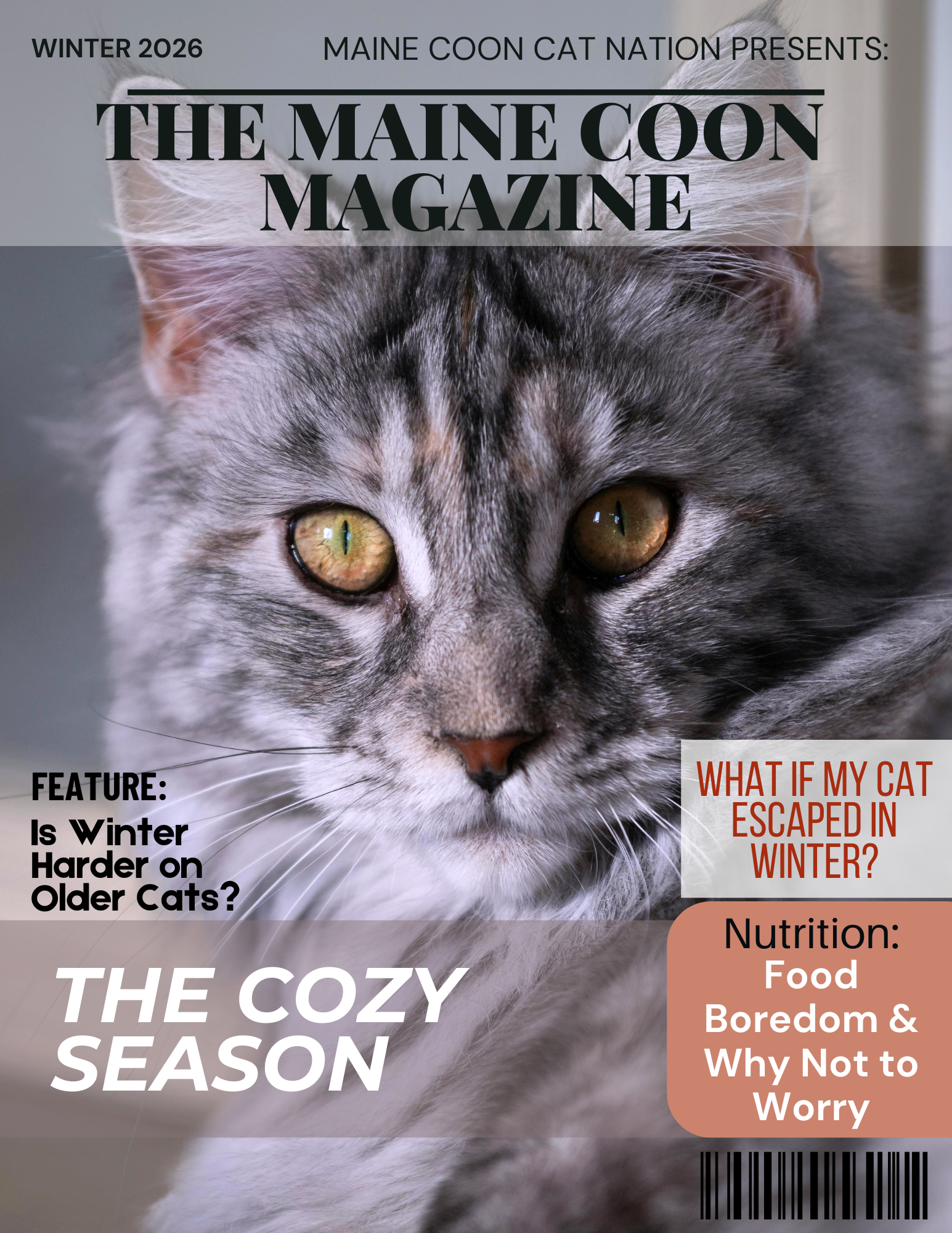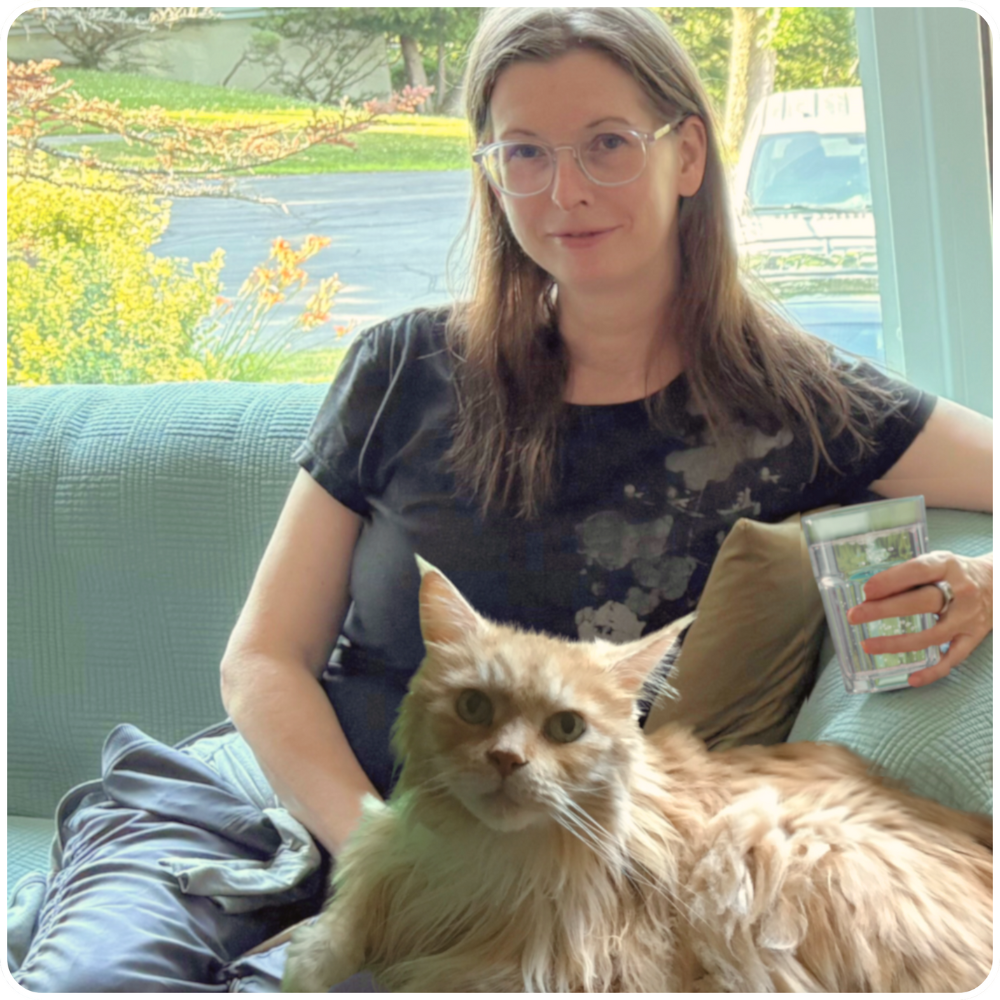- Home
- Maine Coon Kittens
- Maine Coon Kitten Behavior
Maine Coon Kitten Behavior: What to Expect With This Amazing Breed!
•
How would I sum up Maine Coon kitten behavior? Pure joy! Responsible Maine Coon breeders usually send kittens home at around 14 weeks of age. Let's talk about what to expect.
If you like this, you'll love our fun, free Daily Digest!

Meet Your New Family Member: The Maine Coon Kitten

Bringing home a Maine Coon kitten is like welcoming a new family member filled with endless energy and personality.
These fluffy little balls of fur aren't just adorable - they're full of quirky behavior that will keep you entertained every day.
Whether they're batting at toys, exploring new corners of your home, or chirping for attention, their antics are both endearing and unique.
Maine Coons are known for being gentle giants, even as kittens. Despite their playful bursts of energy, they have a natural sweetness that makes them excellent companions.
From snuggling up for a nap to following you from room to room, they love being part of your family's daily routine.
As you get to know your new kitten, you'll quickly see why the Maine Coon cat breed is loved by so many.
Their combination of playfulness, affection, and intelligence makes them wonderful family members. Get ready for a lot of fun and a lifelong bond!
Key Maine Coon Kitten Traits:
Full of Play and Energy
Though they'll grow into the largest domestic cat breed, your new Maine Coon kitten is a bundle of energy. Their playful antics and curiosity make them delightful companions.
They love chasing toys, climbing to high spots, hiding in boxes, and exploring every nook of their new home.
With their massive size in the future, it's amazing to watch these little guys tackle new adventures with such enthusiasm.
Whether it's batting at a string or pouncing on a toy mouse, they'll always find a way to entertain both themselves and you.
How playful is a Coonie kitten? 7-month-old Georgina's mom says: "[we] marvel at her antics each day - she has an Olympian ability to speed run, high jump and seemingly effortlessly float through the air from high to low to high platforms, we have had to extend in height and width her 'scratching tree'."
Affectionate But Independent
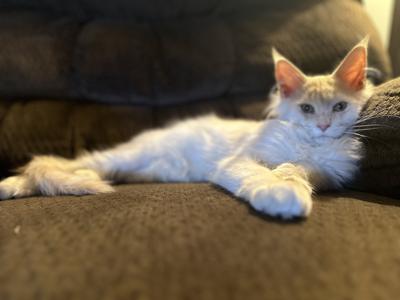 Tibby
TibbyYour Coonie will love spending time with you - following you from room to room, offering companionship.
However, despite their affectionate nature, they also enjoy a bit of independence.
They might happily curl up beside you, but don't be surprised when they wander off to find their own cozy corner.
This mix of affection and self-reliance makes them excellent companions for busy households.
For example, Laura shares about her kittens Benton and Winston: "The two are inseparable, always playing or snuggling, but when they’re done, they find their own space to rest.
Benton especially loves curling up next to me, but when he’s had enough, he’ll happily wander off to relax in his favorite spot."
Talkative and Vocal
One of the most unique behaviors of this breed is how vocal they can be. Even as babies, Maine Coons love to communicate using chirps, trills, and the occasional meow.
You might find your kitty "talking" to you while playing or when seeking attention.
This chatty nature adds an extra layer of charm, making them feel even more like a true family member.
Typical Maine Coon Kitten Behavior:
Curious Explorers
From the moment you bring your new kitty home, expect them to explore every corner.
These little explorers love investigating their surroundings and finding new hiding spots.
As a cat owner, you’ll likely find them in unexpected places - like the laundry basket or on top of the fridge.
Their curiosity knows no bounds, making every day an adventure for them (and for you, as you wonder where they've disappeared to next!).
Helpful Around the House
Coonies are known for their tendency to "help" with whatever you're doing. Even as kittens, they'll follow you from room to room, eager to be involved in the action.
Whether you're folding laundry or working on a project, they’ll always be there, offering their version of help - like sitting on your paperwork or unrolling your yarn.
Lovers of Heights
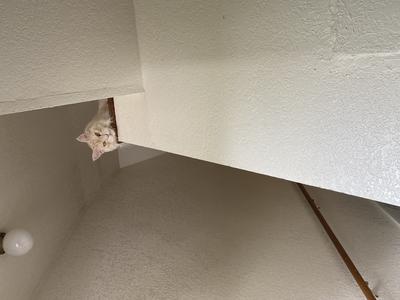 Bodhi
BodhiClimbing is in their nature. These kitties love to perch up high, whether it's on a cat tree or the back of your sofa.
They'll often observe their surroundings from above, where they feel like kings and queens of their domain.
Investing in tall furniture or cat trees can satisfy this natural Maine Coon kitten behavior.
Gentle in Play
Even though they love active, interactive play sessions, Maine Coons are known for their gentle demeanor.
They’re great with children and typically avoid aggressive play. They'll engage with favorite toys without causing chaos, making them ideal companions for families seeking a playful but calm pet.
Training and Socializing Your Coonie:
Litter Training
With proper care and attention, most Coonies are quick learners when it comes to litter training.
Your kitten is most likely fully litter box trained before arriving and only needs to get used to finding the box in their new home.
You can place them near the litter box right after meals and naps, which are common times they'll need to go.
Make sure the box is easy to access, especially when they're young. Consistency is key.
If accidents happen, don't punish them - just guide them back to the box.
Positive Reinforcement
These intelligent cats respond well to positive reinforcement. When training or correcting unwanted behaviors, use treats, toys, or affection as rewards.
Whether you're teaching them to scratch on a post instead of furniture or encouraging good litter habits, positive encouragement goes a long way.
Harsh discipline doesn't work well with Coonies, as they thrive in a loving, supportive environment. Praise them for a job well done, and you'll notice how eager they are to please.
Post-Poop Zoomies
Many cats, especially kittens, dash away from the litter box right after using it. This seemingly silly behavior is actually instinctive.
In the wild, cats would move quickly away from the scent of their waste to avoid attracting predators. At home, that same instinct shows up as a burst of energy once they’re done.
It can also be partly physiological - stimulation of the vagus nerve during elimination can create a brief rush that makes cats feel suddenly lively.
Most cats grow out of it as they mature, though some keep the habit for life, especially high-energy or anxious personalities.
Socializing with Other Pets
Introducing your new kitty to older cats or other pets should be done slowly and calmly. Start by keeping them in separate spaces but allow them to sniff each other under doors.
Gradually increase their time together, always supervising at first. Maine Coons generally have a friendly, easygoing nature, so they tend to get along well with other pets.
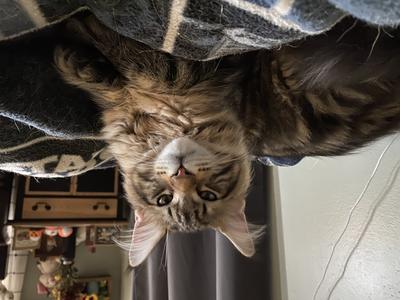 Falkor
FalkorAs Michelle in Maine shares about her 5-month-old kitten Falkor, "He loves to wrestle with our other cats and dogs, especially our chihuahua, since he already outweighs her!"
Proper care during these early introductions will help build lifelong bonds. Remember, patience is key - let them adjust at their own pace for the smoothest transition!
Teething and Chewing in Your Coonie:
Navigating the Teething Phase
Like all young cats, your little Coonie will go through a teething phase, usually between three to six months of age.
During this time, they may start chewing on anything they can get their paws on.
To prevent them from nibbling on household items like furniture or shoes, provide them with appropriate chew toys.
Soft rubber toys or dental sticks can be a lifesaver, offering comfort while soothing their gums. Regularly check their toys for wear to ensure they stay safe during playtime.
Redirecting Chewing Behavior
It's important to address any negative behavior early on to avoid behavioral problems later.
If your baby starts chewing on something they shouldn't, gently redirect them to an appropriate toy. Never use aggressive behavior or punishment, as it can confuse them and worsen the situation.
Instead, observe their body language and step in calmly when needed. Reward them with praise or a treat when they chew on the right items - positive reinforcement helps them understand what’s allowed.
If chewing becomes excessive, make sure they're getting enough mental and physical stimulation.
Often, negative chewing is a sign of boredom. Interactive toys, play sessions, and puzzle feeders can help burn off energy and prevent destructive habits from forming.
With proper care and redirection, your Coonie will learn to manage their teething phase without damaging your home!
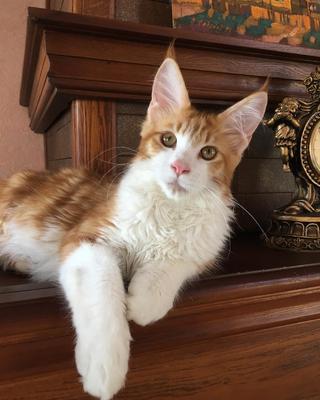 Tiltill
TiltillUnderstanding Your Coonie's Growth Stages:
A Long Kittenhood
One of the unique things about Coonies is their extended kitten phase. Unlike other breeds, they grow slowly and may not reach full maturity until they’re around 3 to 4 years old.
During this time, your little one will likely maintain that playful Maine Coon kitten behavior, even as their body starts to resemble a full-grown cat.
Maine Coon owners often find this long kittenhood both endearing and fun, as it means more time to enjoy their energy and curiosity.
Physical and Mental Development
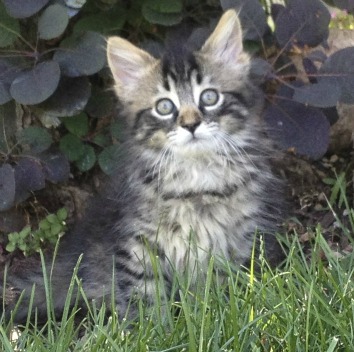 PJ
PJFrom a young age, your Coonie will go through various developmental stages.
Early on, they'll be all about exploring, pouncing, and even engaging in rough play.
As they grow, you may notice that they start to settle down, becoming more relaxed but never losing that spark of playfulness. Even as an adult indoor cat, they'll still love a good play session with their favorite toys.
Maine Coon kitten behavior evolves slowly, and their mental development follows suit.
They mature at their own pace, balancing moments of calm with bursts of energetic play.
While they'll eventually adopt a more laid-back attitude, their friendly and interactive nature will stay with them for life.
So, whether they're a rambunctious little guy or a relaxed adult, your Coonie will always bring joy with their playful personality.
Do Maine Coons get less cuddly as they mature?
Nelson in Nashville asked: "Tintin is 14 months old, and I love him like crazy. He’s still playful and friendly, but not the cuddly kitten he used to be.
These days, he's more independent - and honestly, I'm having a hard time with the change. He used to curl up in my lap, purring nonstop.
Now, he does his own thing. Is this typical for the breed? Do they go through a more distant phase as they mature?"
Answers from other Coonie parents:
-
Bastet:
"Totally normal. Cats are hunters, especially at night. My girl makes this funny howling noise when she "catches" toys and wants me to praise her. After that, she calms down and cuddles."
-
Smokey Joe’s Mama:
"Sounds just like my boy! Used to demand belly rubs - now he just holds our hands gently when we stop. He’s still loving, just on his own terms."
-
Charles Dove:
"My Coonie Sergiy is the same age. He still sleeps beside me and purrs, but he doesn’t hop on the couch for cuddles like before. I’ve come to love the quieter kind of affection he shows now."
-
PJ:
"Our Maya mellowed out at a year old too. Still loves grooming time and sticks close, but she’s less zoomy and clingy than she was."
-
Andrea:
"Our rescue, Riley, is now 10½. He's always been cuddly, but like many Coonies, he settled into a more mellow, affectionate rhythm with age."
Wondering just how affectionate these gentle giants can be? We’ve put together a full page on the topic: check out Are Maine Coons Cuddly? for more.
Common Challenges in Maine Coon Kitten Behavior:
Separation Anxiety
Coonies are known for their social and affectionate nature, which can sometimes lead to separation anxiety, especially when they’re adjusting to a new home.
If your baby seems anxious when you leave, try creating a safe, comforting space for them. Use items that carry your scent, like a blanket or a shirt, to help them feel secure.
Interactive toys can also keep them occupied when you're away, reducing stress.
Cat owners can ease behavior issues like this by gradually increasing the time they spend apart, helping their kitty adjust.
Nighttime Activity
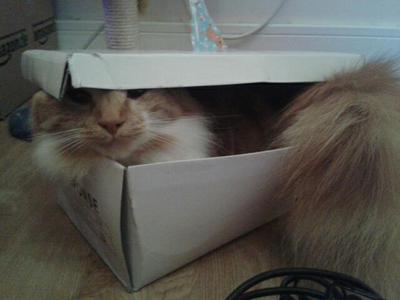 Charlie
CharlieMany young cats, especially Coonies, tend to be more active at night, sometimes causing late-night chaos when you’re trying to sleep.
To help shift their schedule, make sure to engage in plenty of interactive play sessions during the day.
A good playtime before bed will tire them out and help them settle down for the night.
You can also establish a consistent feeding routine, offering their last meal in the evening to encourage restful sleep.
Over time, your little guy will learn to match your rhythm, reducing those nighttime adventures.
Coonie owners who understand these unique behaviors early on can take proactive steps to address potential behavior issues, ensuring a smooth transition into a happy, well-adjusted adult cat.
Working with reputable breeders who socialize their babies from a young age can also make a big difference in your Coonie’s comfort level.
Creating a Stimulating Environment for Your Coonie:
Interactive Toys
Keeping your kitten mentally and physically engaged is a good idea, especially since they're such intelligent, curious cats.
Toys that stimulate their hunting instincts, like feather wands, laser pointers, or puzzle feeders, can be a great way to challenge their mind and body.
These toys allow them to mimic natural behaviors, keeping them active and preventing boredom. Make sure to rotate toys regularly to keep things interesting.
Scratching Posts and Climbing Structures
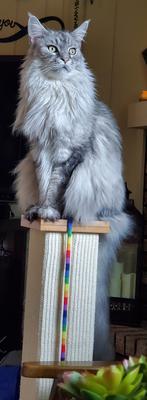 Centauri Blu
Centauri BluCoonies love to climb and scratch - it's part of their unique behavior.
Setting up tall scratching posts and sturdy climbing trees is essential for your kitty’s happiness.
It's a good idea to place these structures near windows or in busy areas of the house, where they can keep an eye on everything.
This not only helps burn off energy but also satisfies their natural instincts to perch and observe their surroundings.
Bonding Time
Interactive play sessions are a perfect way to bond with your baby and help them release energy.
Coonies thrive on companionship, so spending time with them daily is crucial.
Playtime before their evening feeding schedule can be especially effective at helping them wind down for the night.
Along with proper nutrition and a consistent routine, these activities will help keep your Coonie happy, healthy, and well-adjusted. Plus, you'll build a stronger connection that lasts a lifetime!
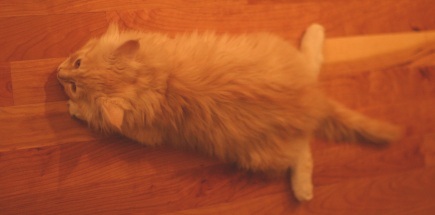 Little Leo
Little LeoFAQ's About Maine Coon Kitten Behavior:
Are Maine Coon kittens more active than other breeds?
Are Maine Coon kittens more active than other breeds?
Yes, these babies generally toward the more playful and energetic side. They love to explore and engage with their surroundings.
How do I stop my Maine Coon kitten from chewing on things?
How do I stop my Maine Coon kitten from chewing on things?
Provide appropriate chew toys and redirect their attention when they nibble on household items. Consistency is key!
Why does my Maine Coon kitten follow me around the house?
Why does my Maine Coon kitten follow me around the house?
This behavior is normal Maine Coon kitten behavior. Coonies are social cats and enjoy being near their owners for companionship.
At what age do Maine Coon kittens calm down?
At what age do Maine Coon kittens calm down?
They can stay extra-playful for a few years. Most Coonies start to settle down around 3 to 4 years old but will always enjoy a good play session with you.
Do Maine Coon kittens get along well with other pets?
Do Maine Coon kittens get along well with other pets?
Yes, they typically socialize well with other animals. Proper introductions and patience help ensure a smooth transition.
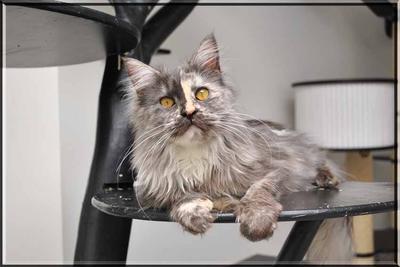 Sammi
SammiOur Top Tip for curbing problematic Maine Coon kitten behavior and encouraging good behavior: Create a Stimulating Environment!
Maine Coon kittens are playful and curious, so providing an engaging environment is crucial for their happiness and development.
A well-stimulated kitten is less likely to develop behavioral issues, such as chewing on furniture or being overly hyperactive.
Here are the best ways to keep your little guy entertained and enriched:
Interactive Play: Maine Coons thrive on play that mimics their natural hunting instincts.
Grab some feather wands or laser pointers and watch your baby spring into action! Puzzle feeders are also fantastic - they challenge their minds and provide physical activity.
Don't forget to switch up the toys regularly to keep things exciting!
Climbing Structures: Did you know Coonies love to climb? Tall scratching posts and cat trees are essential for satisfying their desire to perch and observe their surroundings.
Place these structures near windows or in busy areas of your home. Your Coonie will appreciate having a high vantage point to keep an eye on everything happening around them.
Safe Spaces: Every Coonie needs a cozy retreat. Create safe hideaways with soft blankets or beds where they can relax and recharge.
This not only gives your baby a sense of security but also helps prevent overstimulation, especially in a busy household.
Routine and Schedule: Consistency is crucial for helping your baby feel secure. Establishing a regular feeding schedule and dedicated playtime can make a world of difference.
Maine Coon cats love routine, and knowing what to expect each day helps them thrive!
Bonding Time: Last but certainly not least, don’t forget the power of bonding! Spend quality time with your Coonie through interactive play sessions.
This strengthens your relationship and fosters trust, making your Maine Coon kitten feel loved and secure in their forever home.
If you're raising a kitten or just love watching them grow, head back to the Maine Coon Kittens section for more on what life is like with these little whirlwinds as they find their footing!
